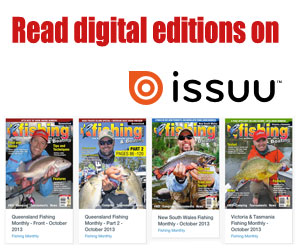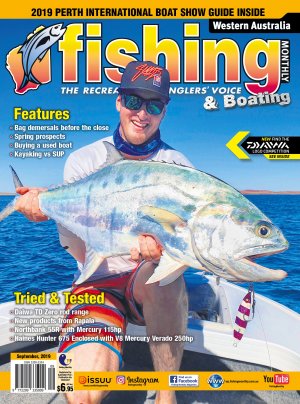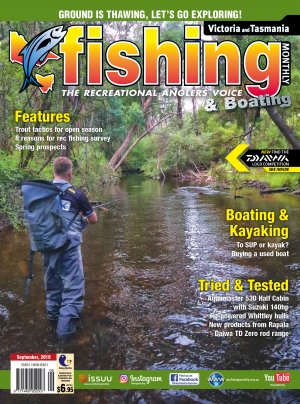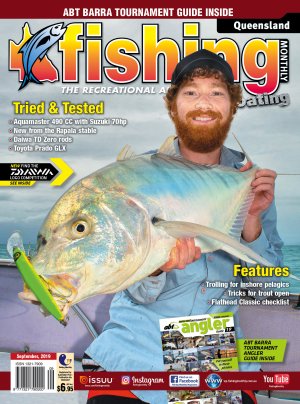A phone-around has revealed that not many people have been doing much fishing and now that the bushfires have finally been quelled, most of us have been catching up on the many things we didn’t have time to do during the fires.
A big thanks to all who volunteered their services during the fires, from the front-line fire fighters of the CFA, DSE, Parks Victoria, Red Cross, CWA, SES and the Army, right through to the babysitters and others who have been away from home. The real community spirit that dominates Australian culture has, as always, come to the fore in times of crisis.
Most of the major roads through the Victorian and NSW high country are open again but you should check with local authorities before setting out, as many of the lesser roads and fire trials may not have been cleared yet. Even if the fishing is not great, the scenery is quite spectacular in a tragic way. It is well worth trip to the fire-damaged areas to see the damage and to realise just how fragile our landscape is. The effects of the fires will be with us for many years.
I have been through the Victorian high country over the past couple of weeks, checking out the damage and testing the waters, so to speak. Most of the higher streams and rivers were virtually lifeless at the time. They presented a bizarre picture where the heavy undergrowth along the banks has been totally burnt away, leaving no cover for the fish and no habitat for the fauna that is the major part of the fish food chain.
No fish were caught and very few were seen but, as the bush recovers, so will the fish. With trout spawning season rapidly approaching, the loss of abundant food may affect on their ability to build up enough condition to survive the rigours of spawning. If the fish do survive in sufficient numbers to spawn, the next problem is the eggs surviving extreme siltation as the rains wash ash and topsoil into the waterways.
On the upside, much of the pest vegetation, such as blackberry and English broom, has also been destroyed so wading the streams should be a good deal easier, for the next couple of years at least.
The drought still has us in its grip with water levels in the catchments at record low levels. Lake Hume has dropped to 5% and remains steady. Dartmouth Dam was at 38% and still falling, its lowest in 20 years. The water quality is poor, the water being discharged having high levels of iron and manganese, along with hydrogen sulphide gas. Ironically, drinking water for the township of Dartmouth, right under the dam wall, has had to be trucked in!
The Mitta Mitta River is still flowing at maximum capacity and will probably continue to do so for the rest of this month. The poor water quality being discharged from Dartmouth will probably have an adverse effect on fish and fishing. The Kiewa River is very low and, combined with high water temperatures, has not been fishing well. A good dose of rain will be needed to spark it up again.
Higher up in the mountains, the catchments of Pretty Valley and Rocky Valley are likely to be good prospects. The fire damage adjacent to these lakes has not been as severe. They should fish well until Winter sets in. There have been reports of large fish kills in the Ovens River since the bushfires. The EPA is investigating and at the time of writing the cause and extent of the kills are unknown.
The good news is Lake Mokoan is still fishing well and good catches of yellowbelly are being reported, along with the occasional cod. A friend who was fishing there recently lost a nice Ugly Stik and ABU 6500 reel which was towed over the side of the boat by a fish of immense proportions, so he says. Next time he recons he might back the drag off a bit more and use the rod holders.
Earthworms and sweet corn kernels are the best baits by far in this lake. The water is very murky, almost a milky white, when there is a strong wind chop. Mokoan is vast lake and you should keep moving about until you find fish – a bit like chasing redfin if you like. Berley is also useful here. You can make your own or buy commercially prepared berley formulated for fresh water.
Easter will see far more than the usual hordes descend upon Lake Mulwala and the Murray River as it maintains high water levels for irrigation release. It would be wise to book accommodation early or, if you’re planning on camping, get there early to stake your claim to a campsite.
The river and the lake will be very busy with anglers and water skiers so I recommend that you fish early mornings and late afternoons into the night for the best chances. Try using shallow-running or surface-popper lures at night during the full moon. Fish close to the shoreline around overhanging trees and steep banks.
Bait will be at a premium so make sure that you bring your own or pre-book it with your accommodation. Bardi grubs are the prime bait for Murray cod and yellowbelly, followed by scrub worms and yabbies.
We covered the trolling methods, lure types and techniques pretty well last month. Remember to work your lures slowly and give each area that you target a good workout before moving on to the next. If you are fishing with another boat or boats, troll close behind each other as this increases the chances of provoking a strike from otherwise uninterested fish.
I have changed my email address, which is now --e-mail address hidden-- Drop me a line for an updated report if you’re heading down this way.
captions
1
A view of Dartmouth village and Lake Banimboola (the pondage) from the top of mount Benambra after the fires.
2
The author with a 43cm Lake Mokoan yellowbelly. Note the very pale appearance of the fish, caused by the murky water. When it’s choppy, this lake turns milky white.
3
Ethan Foster of Wodonga with a good Lake Mokoan yellowbelly.
4
Paul Foster of Wodonga with a 38cm yellowbelly which was released to grow up.
Reads: 1215



